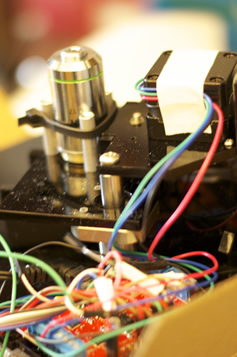OverviewThe Fletcher Lab combines bioengineering, biophysics, and molecular biology to understand how cells move, communicate, and get sick. We ask fundamental questions about how cells are assembled from molecular parts and applied questions about how we can detect and modify those parts to fight disease. This work often involves the development of new experimental methods, microscopy techniques, and microfabricated tools. We also use theory and computation to guide experimental design and make sense of our data. Our work in the areas of mechanobiology, immunoengineering, and disease diagnostics is ultimately aimed at understanding how biological systems work at a mechanistic level so we can develop new strategies to improve health. |
Research Topics

Mechanobiology and Cell Interfaces
Cells are physical objects subject to mechanical forces. How do those forces affect the organization and interactions of cells? We are investigating this question by studying membrane and cytoskeletal biophysics, including how forces feed back on actin network assembly and membrane curvature. One topic of recent interest is the glycocalyx and how the complex set of proteins, glycoproteins, and glycolipids on cell surfaces present physical barriers to cell-cell interactions. We are developing new optical and molecular tools to study the glycocalyx, and we are investigating its role in cell-cell signaling, virus entry, and cell-cell fusion.
Recent work

Immuno-engineering and infectious diseases
Immune responses rely on physical contact between immune cells and their targets. How do immune cells decide what is friend and what is foe? We are exploring the mechanistic details of immune cell interactions and using our physical insights to devise new therapeutic strategies. For example, we are studying how macrophages organize their receptors to recognize targets and avoid host cells, using both in vitro reconstitution and live cell studies. We are also interested in how some pathogens like Schistosoma are able to evade detection by the immune system, and we are harnessing Influenza A to engineer immune cells and other host cells with new functions.
Recent work

Diagnostics and Instrumentation
When the immune system fails to detect disease, new approaches are needed. How can we diagnose infectious diseases and chronic diseases with technologies that increase access to healthcare? We are developing new molecular strategies based on CRISPR-Cas enzymes that enable point-of-care measurements of pathogen and host biomarkers. We are also creating portable microscopes based on mobile phones that, combined with machine learning to interpret images, can identify the presence of pathogens in patient samples. We work with international partners to test and deploy these technologies to address Neglected Tropical Diseases and other global health challenges. Our work on optical microscopy has led to low-cost diagnostic technologies (CellScope) and an introductory optics instructional kit (Thorlabs kit).
Recent work
Affiliations
The Fletcher Lab @ UC Berkeley is part of the QB3 Institute and part of the Department of Bioengineering. We are also affiliated with the Department of Molecular and Cell Biology and the Physical Biosciences Division of Lawrence Berkeley National Laboratory (LBNL), as well as the Blum Center and Center for Information Technology Research in the Interest of Society (CITRIS).
The students and researchers in our lab are part of the UC Berkeley/UCSF Graduate Program in Bioengineering, the UC Berkeley Biophysics Graduate Group, the UC Berkeley Nanoscale Science and Engineering Graduate Group, and various departments and programs at UC Berkeley and UCSF, including MD/PhD and MD/MPH.